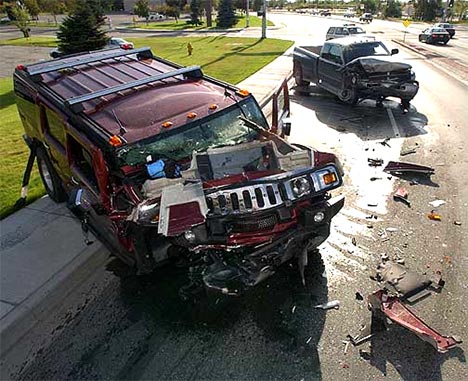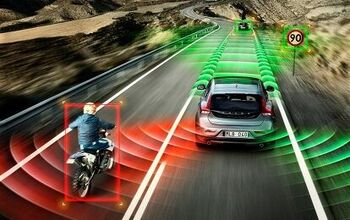On The Safety Of Large Vehicles
The “big car safe, small car unsafe” debate took another interesting turn this week, as researchers from UC Berkeley have released a report arguing that large cars significantly increase the risk of death on American roads. Recent data on the most and least died-in vehicles seemed to show that larger vehicles do indeed keep drivers safer, but this new report seems to roll back the impact of that finding. Slate reports that researchers
studied accident data from eight states, identifying the type and weight of vehicles involved in collisions by their VIN numbers. The researchers confirm that the heavy cars kill. Indeed, controlling “for own-vehicle weight, being hit by a vehicle that is 1,000 pounds heavier results in a 47 percent increase” in the probability of a fatal accident. The chance is even higher if the heavy car is an SUV, pickup truck, or minivan. (Taller vehicles tend to do outsize damage, too.)
The researchers then set out to calculate the value of the “external risk” caused by our heftier vehicles. First, they considered a scenario in which a driver chose between a car with the 1989 model-year average weight of 3,000 pounds or the 2005 weight of 3,600 pounds. The heavier car increased the expectation of fatalities by 0.00027 per car—27 deaths per 100,000 such vehicles. “Summing across all drivers,” they write, “this translates into a total external cost of $35 billion per year,” using the Department of Transportation’s value of a statistical life of $5.8 million. Judging against a baseline in which a driver chose the smallest available car, such as a Smart Cars, the cost is $93 billion per year. The price tag climbs beyond $150 billion per year if you include the cost of pedestrian and motorcyclist deaths and figure in multi-car collisions.
The problem is that American roads consist of a mix of heavier and lighter cars, and the biggest danger is when they encounter each other. The authors write that relative weight is what is most dangerous in crashes. The recent vogue for lighter vehicles, driven in part by high gas prices and changing fuel-economy standards, has raised worries about the chance of more collision deaths. One study found that higher fuel-economy standards imposed in the 1980s led to 2,000 additional deaths per year. If Americans suddenly start buying many more ultra-light cars, it is not hard to imagine more deadly accidents as a result.
That’s a pleasant thought, isn’t it? The eternal bugbear of US automotive regulation, the tradeoff between safety and fuel economy, just won’t go away. So what’s the solution?
Given the relationship between big cars and bad accidents, it might make sense to make such cars more expensive to buy or drive. You could do this with insurance premiums, or lawsuits. But the economists suggest a gas tax, “because it is simple and because gasoline usage is positively related to both miles driven and vehicle weight.” They say it would take a 27-cent-per-gallon gas tax to account for the $35 billion per year in extra costs from heavier cars. (To account for the $150 billion in extra costs would require a tax of more than $1 per gallon.)
Notch up another, if somewhat more debatable, reason to increase the gas tax (as if we needed another).
More by Edward Niedermeyer
Latest Car Reviews
Read moreLatest Product Reviews
Read moreRecent Comments
- Normie Typical phone distortion enhances the clunky ugliness of that maple Silvy.Please use real cameras.
- Dean finally a good use for tariffs ! It will keep this abomination out of north americaman that thing is ugly. interior isn't so bad but the outside..just WOW
- Redapple2 They ll sell 8 of 'em
- Kjhkjlhkjhkljh kljhjkhjklhkjh utterly dumb use case .. lets jar, shake, thermally shock, cover in water, hammer, jump and violently vibrate all the things that combust and connect stupid amounts of current.
- Slavuta Das Kia Visionhttps://www.kia.com/us/en/kia-collective/vision/designing-the-next-chapter.html


































Comments
Join the conversation
Off course I like gas taxes, sales taxes, income taxes....it's nice to be needed. Capitalism increases the number of choices, this is not incompatible with the text book definition. No true monopoly could exist with out protection, at least that's what Uncle Milton taught me. That's why corporations invest so much in lobbyists...helps keep the wolves at bay. Why would commuting in an F450 make me a D-Bag? I don't block the left lane, I use my turn signal, and let old ladies cross the street. Such anger! BTW-F450's check in at closer to 4.5 tons full of fuel, not 3 tons. But I guess I'm being a D-bag by pointing that out.
I'd rather get in a wreck while driving my wife's mid-size SUV then in my daily driver Civic.